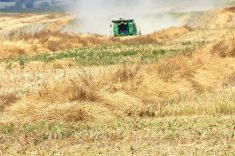By Karl Plume
CHICAGO, Feb 18 (Reuters) – Oilseed futures are rising Tuesday as adverse weather in South America fuelled concerns about smaller crops in key exporters Brazil and Argentina.
Light rain was expected in many parts of Brazil over the next few days to reduce the stress on crops but damage has already been done.
“The U.S. grain trade has been behind in reacting to the weather situation in South America,” said Rich Nelson, chief strategist with consultancy Allendale Inc.
Analysts at Brazilian consultancy AgRural shaved 1.8 million tonnes off their estimate for Brazil’s 2013-14 soybean crop on Monday, saying drought in much of the country in recent weeks had reduced yields.
Read Also

U.S. livestock: Cattle regain ground, hogs dip
Chicago cattle futures regained ground on Wednesday after falling off a cliff late last week. Most-active December live cattle contracts…
AgRural now expects a crop of 87 million tonnes, down from 88.8 million tonnes previously and well below the U.S.
Private analysts at Brazilian agricultural research firms Agroconsult and Celeres also trimmed their forecasts.
Department of Agriculture estimate for 90 million tonnes.
“After the decline in AgRural’s soybean production estimate over the weekend, we’re wondering if we maybe have to start taking a bit off the expectations we’ve been talking about over the last couple of weeks,” Nelson said.
In Argentina’s main soybean-growing region, weeks of heavy rain have encouraged the spread of caterpillars that are eating into the 2013-14 season’s crop yields, a climate expert said on Monday.
The less favourable conditions in South America added to concerns about tight U.S. soybean stocks, which have been whittled down by record-strong export demand.
Meanwhile, cancellations of U.S. purchases by China and switching of orders toward South American supplies have been below expectations.














